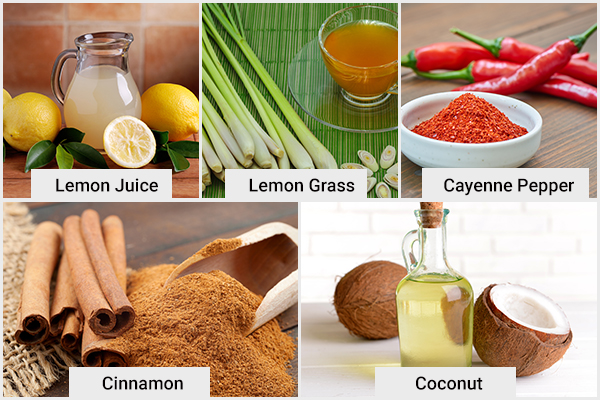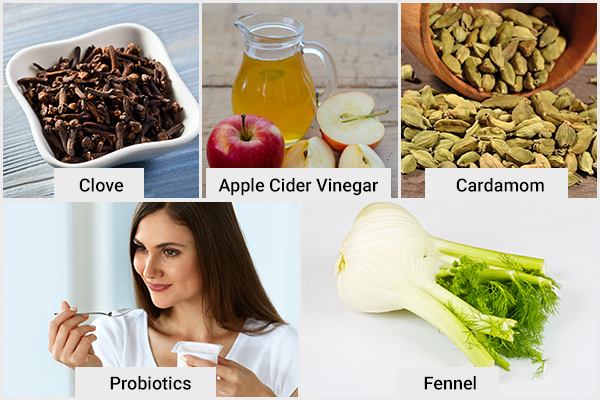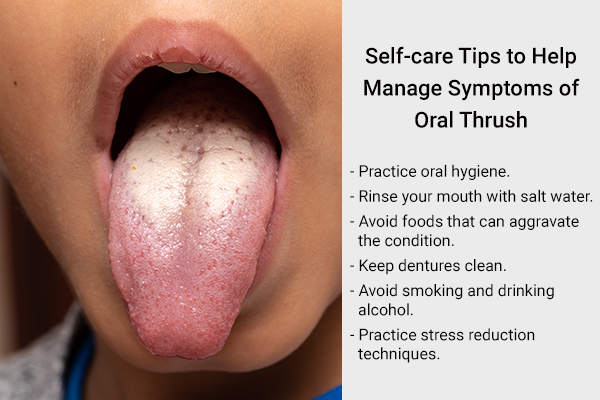In this article:
Oral thrush is a common fungal infection of the mouth caused by an overgrowth of Candida albicans. While antifungal medications are often necessary to treat the condition, there are several home remedies that may help to relieve symptoms and promote healing.

This article will explore some of the most effective home remedies for oral thrush, including natural antifungal agents, dietary changes, and self-care practices to support oral health
How to Manage Oral Thrush at Home
Here are some natural remedies that may help you get rid of oral thrush at home.
1. Use lemon juice
A study studied the effectiveness of lemon juice on oral thrush and found that, although lemon juice stings, it speeds up the healing of oral thrush. (1)
How to use:
- Squeeze lemon juice from a fresh lemon, and dilute 20 ml of lemon juice with 10 ml of water. Rinse your mouth with half of the mixture and then spit it out. Wait for approximately 5 minutes, and then put the remaining half of the mixture in your mouth, keeping the lemon juice in contact with the affected areas for as long as possible. Then, swallow the lemon juice.
- Use 2–3 drops of pure lemon juice 3 times per day for the next 10 days or until clinical cure. The maximum allowed treatment period is 10 days.
2. Consume lemongrass
One study found that the intake of an infusion of lemongrass for oral thrush management produced the fewest negative side effects, and compliance among the study participants was good. (1)
How to use:
- Take half a packet (12.5 g) of dried lemongrass and make an infusion with 500 ml of boiling water.
- Boil the infusion for 10 min and cool.
- For the first treatment, drink 125 ml of the lemongrass infusion. Thereafter, drink at least 250 ml twice a day.
- Do this for 10 days. A fresh infusion must be made every 24 hours.
Any garden can grow lemon trees and lemongrass. These are affordable perennial plants that can effectively treat oral thrush in patients with AIDS.
3. Consume cayenne pepper
Cayenne pepper is known to treat cellulitis, dry mouth, periodontitis, and oral ulcers. (2) All of these can be progressive symptoms of oral thrush.
Consuming cayenne pepper regularly can maintain the health of the oral cavity and, hence, prevent the development of oral thrush.
4. Try using cinnamon
Cinnamon effectively treats oral yeast infections because of its antifungal, antibacterial, antiviral, antiparasitic, and antiseptic characteristics.
According to a literature survey, cinnamon mostly contains essential oils and significant substances including eugenol, cinnamaldehyde, cinnamic acid, and cinnamate. It performs well as an anti-inflammatory, antioxidant, ulcer, antimicrobial, and antidiabetic, among many other functions. (3)

5. Coconut usage can help with oral thrush
Coconuts are commonly available ingredients present in almost every Indian household. They are highly beneficial in the treatment of oral thrush, gingivitis, and oral ulcers.
Coconut oil can inhibit yeast infections, thanks to its effective antifungal properties. (2)
How to use:
You may try oil pulling by swishing with coconut oil for 5–10 minutes in the morning to rid your body of harmful pollutants. Avoid swallowing the oil to prevent consuming all of the microorganisms your body just expelled.
6. Use clove
Clove is a readily available spice that helps in reducing dental pain, tooth sensitivity, dental caries, gingivitis, halitosis, and dry sockets, all of which occur with advanced oral thrush. (2) It is commonly found in most herbal toothpastes, too.
How to use:
- Infuse clove flowers and use the tea as a mouthwash.
- You can also try chewing clove.
- You can also make tea with clove essential oil by adding 1 to 2 drops of it in warm water and drink 1–3 times daily.
7. Increase your probiotic intake
A randomized, double-blind, placebo-controlled study carried out for over 16 weeks found that probiotic therapy tended to reduce the likelihood of oral discomfort, mucosal lesions, and dry mouth.
Regular usage of probiotics can help treat or prevent oral thrush without any negative side effects. Probiotics are consequently regarded advantageous to overall oral health because they reduce the chance of hyposalivation and the sensation of dry mouth. (4)
Probiotics can be consumed in the form of curd, yogurt, cheese, or fermented foods such as dosa or idli.
8. Try using apple cider vinegar and white vinegar
Both apple cider vinegar and white vinegar have qualities that help lessen the severity of a yeast infection. Apple cider vinegar is highly effective in dealing with bad breath, a dry socket, and cellulitis. (2)
How to use:
Dilute one teaspoon of vinegar with one cup of water and rinse your mouth with this solution once a day.

9. Chew on some cardamom pods
Cardamom pods are very effective in dealing with dry mouth, which may be a result of oral thrush. Hence, it is effective in managing symptoms of oral thrush.
Keeping a pod in your mouth and chewing it stimulates salivary flow and helps to reduce the risk of the development of oral fungal infections such as oral thrush. (5)
10. Chew on fennel seeds
As with cardamom and cloves, chewing fennel helps in the production of saliva, which helps to reduce the incidence of oral thrush. Fennel also contains essential oils that aid in reducing the symptoms associated with oral thrush.
A study found that consuming fennel oil either alone or with other fungicides is quite effective in treating oral thrush. (6)
Self-Care Against Oral Thrush
In addition to medical treatments, these self-care tips can help manage the symptoms of oral thrush and prevent further infections.

- Practice oral hygiene: Brushing your teeth twice a day with fluoride toothpaste and flossing at least once a day can help remove bacteria and plaque from your teeth and gums, which may contribute to thrush.
- Rinse your mouth with salt water: Dissolve ½ teaspoon of salt in 1 cup of warm water, and swish the solution around in your mouth for a few seconds before spitting it out. Salt water can help soothe the mouth and promote healing.
- Avoid foods that can aggravate the condition: Sugary, acidic, and spicy foods can all irritate the mouth and make thrush worse. Avoid these foods until your symptoms improve.
- Keep dentures clean: If you wear dentures, make sure to clean them thoroughly every day to remove any bacteria or fungus. Soak them in a denture cleaner for the recommended time, and then brush them with a soft toothbrush before rinsing them off.
- Avoid smoking and drinking alcohol: Both smoking and alcohol can irritate the mouth and make thrush worse. (7) Quit smoking and avoid alcohol until your symptoms improve.
- Practice stress-reduction techniques: Stress can impair immunity, making it more difficult for your body to fight off diseases. (8) To lower stress, do relaxing activities such as yoga, meditation, or deep breathing.
By following these self-care tips, you can help manage the symptoms of oral thrush and support the healing process. However, it’s important to keep in mind that these tips should be used in conjunction with medical treatment, not as a substitute for it.
If your symptoms persist, consult your healthcare provider for further advice.
Most-Asked Questions About Oral Thrush
Is oral thrush a lifelong disease?
No, it can be managed with timely treatment and by following the protocol given by your doctor. (9) Some amount of the fungus is present even among healthy people; hence, there is no need to worry if the yeast is present in small quantities.
Is oral thrush a serious infection?
It is more common than you might think! A small amount of the fungus is present in all individuals; it is only the overgrowth that can cause problems. You can keep it in check using the medications prescribed by your doctor or by using home remedies.
I have just been diagnosed with oral thrush. What are some home remedies that I can use?
While continuing your treatment, you can make use of some of the home remedies stated above.
Additionally, changing your toothbrush and tongue cleaner may help in reducing recurrences of oral thrush. Consult with your doctor about the kind of mouthwash you should be using.
Are there any easy dietary measures I can take to reduce oral thrush?
In addition to using lemon, herbs, and spices, reducing sugar intake is also a common way to control and prevent recurrences of oral thrush. Just by reducing the amount of sugar you add to your tea or coffee and reducing the quantity of desserts you consume, you can control oral thrush.
Final Word
Although yeast infections can be quite painful, they are more of an annoyance and a burden to cope with than a life-threatening issue.
Asking your doctor about alternative treatments is usually a smart option, especially if your yeast infection is chronic. Pregnant women should speak with a doctor before using any over-the-counter or drugstore medications.
Alternatively, as mentioned above, numerous healthy alternatives can provide quick relief from bothersome yeast infections!
 Continue ReadingOral Thrush: Causes, Symptoms, Risk Factors, and Treatment
Continue ReadingOral Thrush: Causes, Symptoms, Risk Factors, and Treatment
- Was this article helpful?
- YES, THANKS!NOT REALLY


